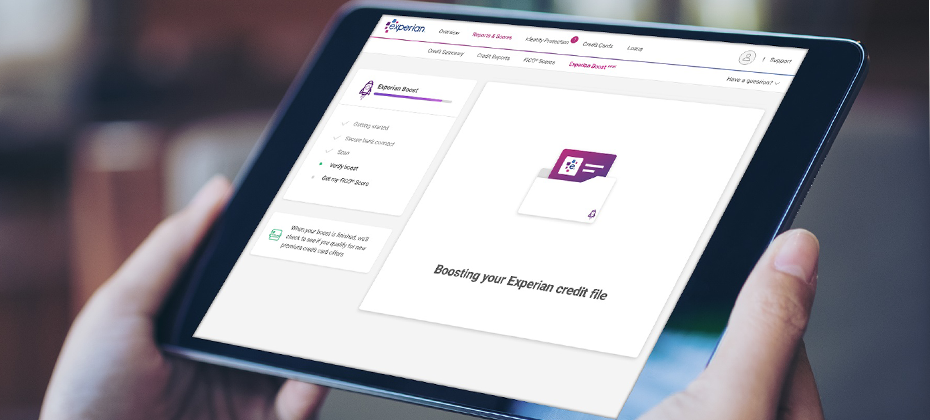World
News about Experian from all over the globe:

While consumers throughout the U.S. continue to manage the impacts of COVID-19, aside from health and wellbeing, one of the most salient concerns has been around the health of consumers’ finances. With many falling under some form of stay-at-home order since the onset of the pandemic, local economies have been jolted and some consumers may be feeling the financial impacts. As part of Experian’s commitment to improve the financial health of Americans and educate on debt and credit, we focused our research efforts to analyze internal and external data to show how consumer finances have changed in recent months. Through our initial review, we found that certain measures of consumer finances, on average, had improved since the onset of the pandemic. Whether due to the unprecedented government stimulus, or changes in spending, consumers saw a reduction in average debt and increased average credit scores. Though the data is rapidly changing and the true financial implications of the pandemic may be partially obscured by governmental stimulus efforts, we wanted to take a snapshot and highlight how consumers are faring in the moment. By providing these insights, we can use data for good, helping organizations, experts, and others apply learnings that may positively guide efforts in the future for the benefit of all. Our Main Findings from January 2020 to May 2020: The average VantageScore has increased by 5 points Total average consumer debt total declined by 1% Average consumer credit card balances have decreased by 14% The average credit utilization ratio has dropped 5 percentage points These findings offer an important snapshot of consumers five-months into the COVID-19 pandemic stay-at-home orders. Though initially positive, we want to keep an eye on these trends as they could change over time as government policies and stimulus efforts are amended to adjust to future conditions. To continue providing relevant insights on prevailing trends in consumer finances, we will work to maintain updated research content as the data become available. You can find links to our most recent research below, and check back at Experian.com/research for updated articles over the coming weeks. Our Most Recent Research Articles: COVID-19 Impact: Changes to Consumer Debt and Credit COVID-19: Consumers Reduce Overall Debt During Pandemic COVID-19: Credit Utilization Drops as Consumers Cut Spending

We are excited to share that Experian is proudly supporting MIT’s Solve initiative, which is focused on helping to solve global challenges. We are committing up to $100,000 for the Good Jobs & Inclusive Entrepreneurship and Learning for Girls & Women challenges. Each promotes the financial health of workers, businesses, and communities affected by COVID-19. At Experian, we feel it is our responsibility to help create a better future for the societies where we work. Today, communities, businesses, and individuals are being confronted with difficult challenges because of COVID-19. We are developing solutions to some of the financial problems that are being faced due to the pandemic. Our key focus is helping people improve their financial health and get better credit, which will help them secure essential services and achieve their goals of owning a home, starting a business, or reaching other ambitions. Some of our accomplishments include Experian Boost having already been used by more than 4 million Americans to try and boost their credit scores; our social innovation programs, focused on delivering societal benefits, which have reached 14 million people; and our employee volunteerism – with employees volunteering 54,000 hours to provide support to people through our financial education and community programs. Through Experian’s Social Innovation funding program, we develop innovative products that aim to offer societal benefits. Our dedication to social innovation will be on display as we support MIT’s Solve Challenge, which focuses on innovation in the social impact space. This competition is open to tech-based entrepreneurs across the globe and is focused on developing solutions to create lasting change. Each year, MIT receives thousands of applicants for this program. Our challenge is specifically related to solving financial health issues which have arisen for consumer groups as a result of COVID-19. We will be splitting the $100,000 prize money to accelerate up to four ideas into market, and we will also provide other assistance such as our in-house expertise and resources. This will include mentoring and potentially data or analytics to support the delivery of the most innovative solutions. Innovation is at the core of this challenge, which is a key focus at Experian. We have been frequently recognised as one of the most innovative companies in the world and feel that our mission and vision will help make this initiative successful. Our people, data, and analytics will support the delivery of the most innovative solutions that are meeting the challenges in today’s challenging landscape. We are proud to be part of MIT’s Solve Challenge and look forward to working with the winners to help create solutions for those most in need.

Many of us have turned to streaming services to help us cope during this time of COVID-19. Being able to escape with some good entertainment while still maintaining our social distance is invaluable right now. Television streaming has skyrocketed 85% since March; I’ve certainly contributed to that increase. Now, subscribing to that streaming service can do more than entertain, it can improve a consumer’s financial health. Starting today, Netflix® customers can possibly improve their FICO® Score by adding their positive payment history through Experian Boost. Experian Boost™† is the innovation we launched in 2019 that can help consumers improve their credit score instantly. So far, approximately four million consumers have connected their utility and telecom bills to Experian Boost, leading to more than 29 million points added to FICO® Scores nationwide. This addition makes sense. Experian Boost already allows consumers to receive credit for paying their cable bills, so paying for a video streaming service on time should also help prove creditworthiness. It’s critical that we meet consumers where they are and adapt to help them in their current position, especially during a pandemic. Anticipating and prioritizing consumer needs is our focus and drives our innovation. After all, we’re consumers too. I’m proud of how our team uses their personal experience and their roles at Experian to create opportunity for millions of people to improve their financial health, especially during these uncertain times. Our job is to help consumers, and that doesn’t stop with their credit score. That’s why we’re also launching new free features available to everyone within the CreditWorks Basic and Premium products. The free tools provide personal insights and resources that can help consumers better save money and manage their financial profile. For more information about Experian Boost go to: www.experian.com/Boost. Experian and the Experian trademarks used herein are trademarks or registered trademarks of Experian and its affiliates. The use of any other trade name, copyright, or trademark is for identification and reference purposes only and does not imply any association with the copyright or trademark holder of their product or brand. Other product and company names mentioned herein are the property of their respective owners. †Results may vary. Some may not see improved scores or approval odds. Not all lenders use Experian credit files, and not all lenders use scores impacted by Experian Boost. Credit score calculated based on FICO® Score 8 model. Your lender or insurer may use a different FICO® Score than FICO® Score 8, or another type of credit score altogether. Learn more.

We sit in a pivotal position in the societies where we work. For us at Experian, using our data and expertise to create a better tomorrow is more than an opportunity. It’s a responsibility. We are pleased to announce we have published our annual Sustainable Business Report 2020, which outlines Experian’s dedication to social and environmental issues and details our corporate responsibility performance. In the report, we also highlight Experian’s target to reach 100 million additional people globally by 2025 with social innovation products and services. Additionally, the Sustainable Business Report focuses on our ambition to become carbon neutral by 2030. By utilizing renewable energy, reducing the carbon impact of business travel, and investing in high-quality carbon offsets, we reduced our carbon footprint by 8% last year and cut the carbon intensity of our business by 14% per $1,000 of revenue compared with the previous year. Additionally, 29% of Experian’s worldwide energy was also renewable. We are excited to share a few key takeaways from this year’s Sustainable Business Report: Experian employees volunteered 54,500 hours in and outside of work time to support their communities. This included over 3,500 hours in March 2020 to support communities as the COVID-19 crisis took hold. In Brazil, we have supported the introduction of new legislation enabling millions of consumers to benefit from the use of ‘positive’ data about the credit and other bills they pay on time. Experian Boost helped over 1.5 million Americans improve their credit scores, collectively boosting their FICO® scores by more than 17 million points. Prove ID-Link helped 7.5 million people in India prove their identity. As a result, more people are able to open a bank account and access credit for the first time. Learn more by viewing or downloading our full Sustainable Business Report here.

“What does a credit bureau do?” is one of the most common questions I’ve answered throughout the years – both at conferences and cookouts. Admittedly, it can be difficult understanding the different roles of credit bureaus, credit score companies, and lenders. Amid COVID-19, it’s important for us to define our purpose and help guide you toward the right resources for financial help. As the consumers’ bureau, Experian is committed to examining financial questions and helping consumers, businesses, and lenders navigate this transitional fiscal landscape. It’s important for you to know your financial options and how to separate fact from fiction, especially during times of crisis. Here are answers to some of the most common questions about credit. Do credit bureaus make lending decisions? This is one of the rare instances in credit reporting for which there is a simple answer. No, credit bureaus do not make lending decisions. Lenders – such as banks, mortgage companies, credit unions, and credit card issuers – help consumers borrow money and they make the lending decisions. The credit bureaus are responsible for working closely with lenders to provide information that helps them make informed and responsible lending decisions. At Experian, we equip lenders with accurate and complete data about consumers’ and small businesses’ credit activity and payment history, which enables lenders to develop a full picture of a borrower’s financial health. During COVID-19, it is important for there to be open lines of communication between consumers and lenders about upcoming payments and payment plans. Some lenders are offering deferments and other workable accommodations to ensure consumers do not fall behind on their payments. It is important for consumers to contact their lenders to understand what options are available to them. Do credit bureaus control my credit score (and whether it goes up or down)? Credit bureaus, like Experian, do not determine your credit score. Credit scores are calculated based on third-party credit-scoring models, like those developed by FICO or VantageScore Solutions. These models use information from your credit reports, including credit activity sourced from credit bureaus, to calculate a credit score. The scoring models are proprietary to the companies that develop them. In the most fundamental terms, the credit bureaus are responsible for compiling the credit reports. The scoring companies create algorithms that calculate the score. Credit scores reflect the information in your credit report at the moment the credit score is calculated. The scores will change to reflect changes in your credit report. You control how you use credit, so you play an important role in determining whether your scores trend upward or slip downward. If you consistently make good credit decisions, your scores will trend upward over time. Reviewing your credit report helps you manage your credit and gives you a full picture of what lenders see. Monitoring your credit report is as important as reviewing bills and bank statements, as your credit is an integral part of your overall financial health. Additionally, with an increase in phishing and cyberscams as a result of COVID-19, it’s especially important to stay informed about your credit report, so that you can dispute anything you believe may be inaccurate and ensure that there is no evidence of fraud that could impact your score. Are lending decisions based solely on my credit score? No, credit scores are just one factor in lenders’ decision-making process. Lenders consider additional information when making a decision, such as employment status, income and information about a consumer’s assets and liabilities. In the wake of COVID-19, lenders may start to tighten their credit standards – meaning consumers may need a higher score to receive a loan. Because of this, it is important to be proactive and take action to mitigate any potential negative impact on your credit score. If you’re worried you may miss a payment, contact your lender to discuss your options. Through April 2021, Experian has partnered with our peer credit bureaus to offer a weekly free credit score at https://www.annualcreditreport.com/. This additional measure will allow consumers to access their credit reports frequently and talk to their lenders with the most updated information possible. How are credit bureaus working with the government during COVID-19? At Experian, we fully supported the signing of the Coronavirus Aid, Relief, and Economic Security Act (CARES Act), which provides relief to Americans through expanded unemployment coverage and by providing grants and loans to small businesses. The CARES Act also provided important guidance to lenders about how to work with consumers affected by COVID-19. Experian is working with lenders to ensure appropriate accommodations are made to protect consumers. Additionally, the credit reporting industry has developed reporting standards for lenders to use during emergency periods, such as COVID-19. These reporting standards allow lenders flexibility when reporting accommodations made to consumers who are experiencing hardships due to the pandemic. For additional questions regarding COVID-19 debt and credit relief options, view Experian’s full list of financial and non-financial institutions’ websites where you can find information on relief measures: COVID-19 (Coronavirus) Credit Card and Debt Relief.

We are delighted to have completed the acquisition of a 60% stake in Arvato Financial Solutions Risk Management Division (AFS RM), expanding our presence in Germany, Austria, and Switzerland (DACH) and bringing Germany’s second largest credit bureau into Experian. It is an incredibly exciting moment for us both and marks a significant step forward in Experian EMEA’s growth ambitions. Together, we form a powerful new partnership in Europe’s economic powerhouse. With AFS RM’s local expertise and sector knowledge of industries like e-commerce, telecoms and insurance, and our global experience and innovation in data, analytics, software, and technology platforms, we will redefine what’s possible for our customers. AFS RM brings market presence with high-quality risk, fraud and identity management products and solutions tailored for key industries. We bring scale, expertise, and innovative products like Experian One and Ascend Analytics on Demand. Together, we will offer the best new technologies into these markets, delivering broad coverage and innovation that enables existing and new customers to make better, faster decisions, ultimately delivering greater access to finance for people across the region. Our new partnership will be branded Experian, which is just one of the ways we’re welcoming AFS RM to the Experian family. I’m delighted it will be led by Kai Kalchthaler as CEO, Experian DACH, who will ensure we help businesses find and fulfill their potential, so they can go further with us. Watch how we’re redefining possible, today, tomorrow, together here.

Juniper Research released their Online Payment Fraud 2020-2024 report in May highlighting key trends in digital fraud, it’s implications on businesses and consumers as well as a competitive analysis for advanced solutions available to secure digital payments. Experian is proud to have contributed to the research and its CrossCore solution considered on their Fraud Detection & Prevention Leaderboard. Key takeaways: We’re in the middle of a payment revolution with mobile payments on the rise. Nearly half the world will be using digital wallets by 2024, with transaction values to increase by almost 60% to over $9 trillion in 2024. Omnichannel expectations are creating new challenges for online payments as new technologies for creating convenience are being exploited by cybercriminals, but it’s preventable. Juniper Research forecasts a $25.5 billion eCommerce transaction fraud loss in 2019, a 17% increase in 2018. By 2024, this will double to almost $50.5 billion. The Fraud Detection & Prevention Leaderboard is an assessment based on a combination of quantitative and qualitative measures but not considered a ranking or exhaustive list of solutions on the market. Experian’s flagship solution, CrossCore, just released its latest advanced features and offers unique functionality that lives up to its layered approach for mitigating fraud and authenticating customers. CrossCore is an integrated digital identity and fraud risk platform that combines rich data assets from Experian with identity insights and capabilities from its curated partner ecosystem. Through sophisticated orchestration, it applies advanced analytics to give businesses confidence in every transaction. CrossCore combines risk-based authentication, identity proofing, and fraud detection into a single cloud platform to make real-time risk decisions throughout the customer lifecycle. The platform is designed to help clients differentiate between their good and bad customers, without disrupting good customers, or increasing customer friction in their attempts to stop fraud. Key profile features: Our partner network, some of which we don’t publicly disclose, cover a variety of categories including, behavioural biometrics (Biocatch), traditional biometrics (Daon), document verification (Mitek, Acuant, Onfido), call centre risk assessments (TrustID, NextCaller), email verification (Emailage), Alternative Data (Ekata, Global Data Consortium, HelloSoda, Pipl), Mobile Phone Verification (Boku/Danal) and Chargeback Management (Chargebacks911). Customers include banks, eCommerce merchants and retail companies, telecommunications providers, travel providers, health providers, insurance companies, and public sector organizations. Advanced Decisioning: CrossCore is designed to leverage the complete raw output in our partner network to perform advanced analytics via Experian’s native machine learning infrastructure. This approach includes a hybrid of Unsupervised models (to generate features), Supervised generic or custom models per use case, and a business rules infrastructure. This provides high levels of accuracy to the client, leading to significantly reduced friction and operational costs. Find out how Experian’s capabilities compare and hear from our experts on how to balance security with convenient customer experiences.

Experian, the global information services company, has agreed to join FDATA in support of its Open Banking initiatives around the world. The commitment includes membership in the UK, US, and EMEA. It reflects Experian's strategy for rolling out Open Banking services across its global footprint that includes South America, South East Asia including Australia and South Africa. Access to Open Banking will complement the organisation's network of credit bureaux, identity verification, and automated decision services that it already provides to consumers and businesses. Open Banking enables Experian to provide additional insight into consumers' and businesses' financial wellbeing. Lisa Fretwell, Managing Director of Data Services at Experian, said: "Joining FDATA helps us to exchange knowledge, thought leadership, and drive innovation at a time when we are increasing our strategic commitment and investment plans for Open Banking. This will also include the UK's Open Finance initiative." Experian helps consumers and businesses to engage with and understand their finance through combining its bureau data with insights generated from Open Banking. Its consumer services business engages with more than 7 million consumers in the UK and more than 30 million in the U.S, empowering people to manage their money and access services at the best available rates. Meanwhile, Experian also works with a range of businesses – from financial services to utilities, and insurance to the public sector – so is well placed to drive successful Open Banking initiatives. Working with FDATA and its members will further improve Experian's prospects of encouraging governments and regulators to commit to delivering the highest possible standards in Open Banking. "Our membership will help us gain insights into policy issues that affect Open Banking and drive initiatives so consumers and businesses can gain greater access to fair and affordable credit," said Paul Haddon, Vice President of Governance & Strategic Initiatives. "Our launch of adding consumer-permissioned data to Experian credit reports called Experian Boost is a great example of how we are innovating and improving financial access for millions of people." Launched in 2019, Experian Boost allows consumers to add positive payment history for telecommunications and utility bills to their Experian credit reports, which can possibly increase their credit scores instantly. Gavin Littlejohn, FDATA Global Chair, added, "FDATA is delighted at Experian's decision to broaden the scope of their membership, a strategy that aligns a significant global footprint with FDATA's ongoing expansion and engagement in multiple markets. A first step in the journey towards Open Finance, Open Banking is undergoing international proliferation. FDATA shapes and influences this dialogue at the earliest possible stages for the good of the consumer and the health of the ecosystem, providing invaluable insights from across market landscapes with regard to delivery and holding markets accountable for ongoing performance. These efforts rest on the pillars of rich, living repositories of comprehensive research, white papers and opinion pieces and, a proven history of successful lobbying and intervention on behalf of the membership. The addition of Experian's voice to the FDATA membership extends the collaborative capability of the combined membership, enhancing the synergy between the members themselves. The unprecedented economic crisis brought about by the COVID-19 pandemic has seen a surge of innovative responses from the Fintech community throughout the global ecosystem. FDATA is uniquely placed to facilitate these conversations between industry, governments, and regulators, encouraging the potential of products and services to yield the best possible outcomes for SMEs and populations as a whole."

At Experian, we’re dedicated to innovation and the COVID-19 pandemic has been an impetus for further innovation. Our driving force of successful innovation is our employees. We foster a culture of continuous innovation, from the way we work to the solutions we create. Global Hackathon As part of our effort to mitigate the impact of the pandemic, we’re launching Experian’s first-ever Global Hackathon. Taking place between June 1 and 5, we’ve invited all our employees to get involved and connect, share knowledge and find new ways to help our clients and consumers on the road to recovery from the COVID-19 pandemic. Mitigating COVID-19 Crisis Through Our Innovations In addition to the Global Hackathon, we’ve committed vast resources to develop innovative technologies and new sources of data and analytics to drive solutions that help people, businesses and society at large. For example, to aid in the United States re-opening efforts, Experian has made available a free interactive U.S. map showing populations at-risk of being most susceptible to developing severe cases of COVID-19. The Experian COVID-19 Outlook and Response Evaluator (CORE) tool is intended to help guide healthcare organizations and government agencies as they plan for COVID-19 recovery in the months ahead. The map leverages de-identified data such as pre-existing conditions and social determinants of health to form a comprehensive picture that predicts possible pandemic impact on communities. To help essential organizations during the pandemic, Experian also created At-Risk Audiences, which leverage our data assets to identify groups of individuals that are most likely to be impacted. These new privacy-compliant segments, offered free of charge, are designed to help these organizations find and communicate with at-risk populations, enabling them to deliver essential services as quickly as possible. In the UK, we’re working side-by-side with the government. As part of this, we’re building models to help predict how this disease will spread in local populations and predict the effectiveness of various treatment therapies. In Brazil, we’ve organized a coalition of universities, data companies and technology leaders to launch Covid Radar with the purpose of working together to minimize the impacts generated by the COVID-19 pandemic and contribute to the recovery of Brazil’s economy. The Covid Radar integrates companies to the hospitals and communities that need donations of ventilators, personal protection equipment, or other supplies. In addition to providing case monitoring and disease forecasting. The COVID-19 crisis has forced innovation and change on a scale and pace we wouldn’t normally see. We remain relentlessly focused on helping vulnerable communities, strengthening the resilience of businesses, and playing an important role in helping consumers and the world economy get back to strength. As part of our global innovation program, we’re hosting a global hackathon to help our employees create new ways to help our clients and consumers on the road to recovery from the COVID-19 pandemic. As one of the world’s most innovative companies, we’re doing everything at Experian we can to provide our unique insights back to key stakeholders so they can prioritize help those who need it most urgently.